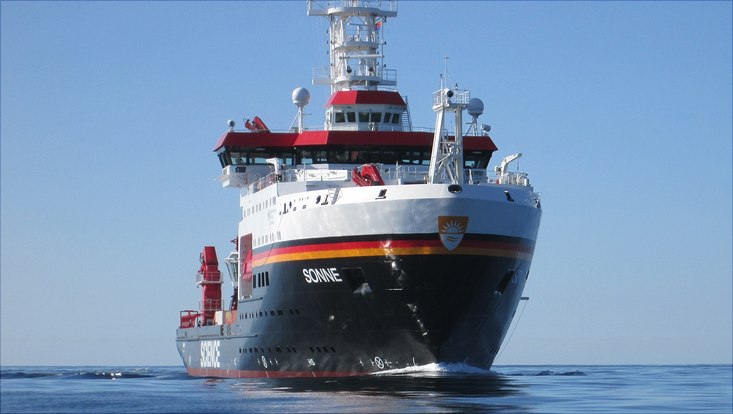11 March 2021
28,000 kilometers to save endangered measurement dataResearch vessel SONNE: An outstanding expedition

Photo: M. Hartig / Meyer Werft
A few of the measuring devices are in the middle of the ocean while others are located within sight of the South African, Namibian, or Angolan coast. The devices enable researchers to supply important information about the causes of climate change or the reasons for the decrease in commercially exploitable fish species in the region. Day and night, week by week, the instruments record the ocean currents, water temperatures, salt and oxygen levels, pH values, and particle flow.
Due to the corona pandemic, researchers could not carry out the necessary maintenance on the devices last year. “Their batteries are only good for a year. If we want to save the data and the instruments, we need to act now,” says Dr. Niko Lahajnar of Universität Hamburg. He is overseeing the expedition as its scientific director throughout the 28,000-km voyage.
For 67 days, Lahajnar and 12 other researchers as well as students from the University of Bremen, Universität Hamburg, the GEOMAR Helmholtz Centre for Ocean Research Kiel, and The Leibniz Institute for Baltic Sea Research, Warnemünde will be gathering data from the 10 anchoring systems bearing a total of more than 100 instruments and sensors to secure the information for research. “Beforehand, we have to go into quarantine for 10 days and while we are on the expedition we cannot leave the ship. Normally, the SONNE anchors in the Pacific and Indian Oceans and the researchers fly to the respective regions. Due to corona, however, everything is different this time,” says the geoscientist.
Without working batteries, the measuring devices cannot continue to operate in the southern Atlantic and they also cannot be retrieved. A radio signal sent from the ship anchors the devices. If the batteries for this signal are dead, the devices stay in the depths forever. If everything works out, the data will be gathered, the devices will be maintained, upgraded, and outfitted with new batteries and then anchored anew in the same position until recovery next year.
Dr. Niko Lahajnar and 4 students from Universität Hamburg will run a blog to provide updates on the expedition and the efforts to rescue data and instruments. Before they depart from Emden, the team will be in quarantine from 9 to 19 March. During this period, team members will be available for interviews. See our Newsroom for an interview with Dr. Lahajnar about the SONNE expedition.
The Federal Ministry of Education and Research (BMBF) and the German Research Fleet Coordination Centre at Universität Hamburg are making the expedition to secure data for the EVAR, TRAFFIC, and BANINO research projects.
